LAKES BUSINESS
SOUTHERN LAKES BUSINESS MONTHLY

Issue 28 – April 2023



Technology and innovation

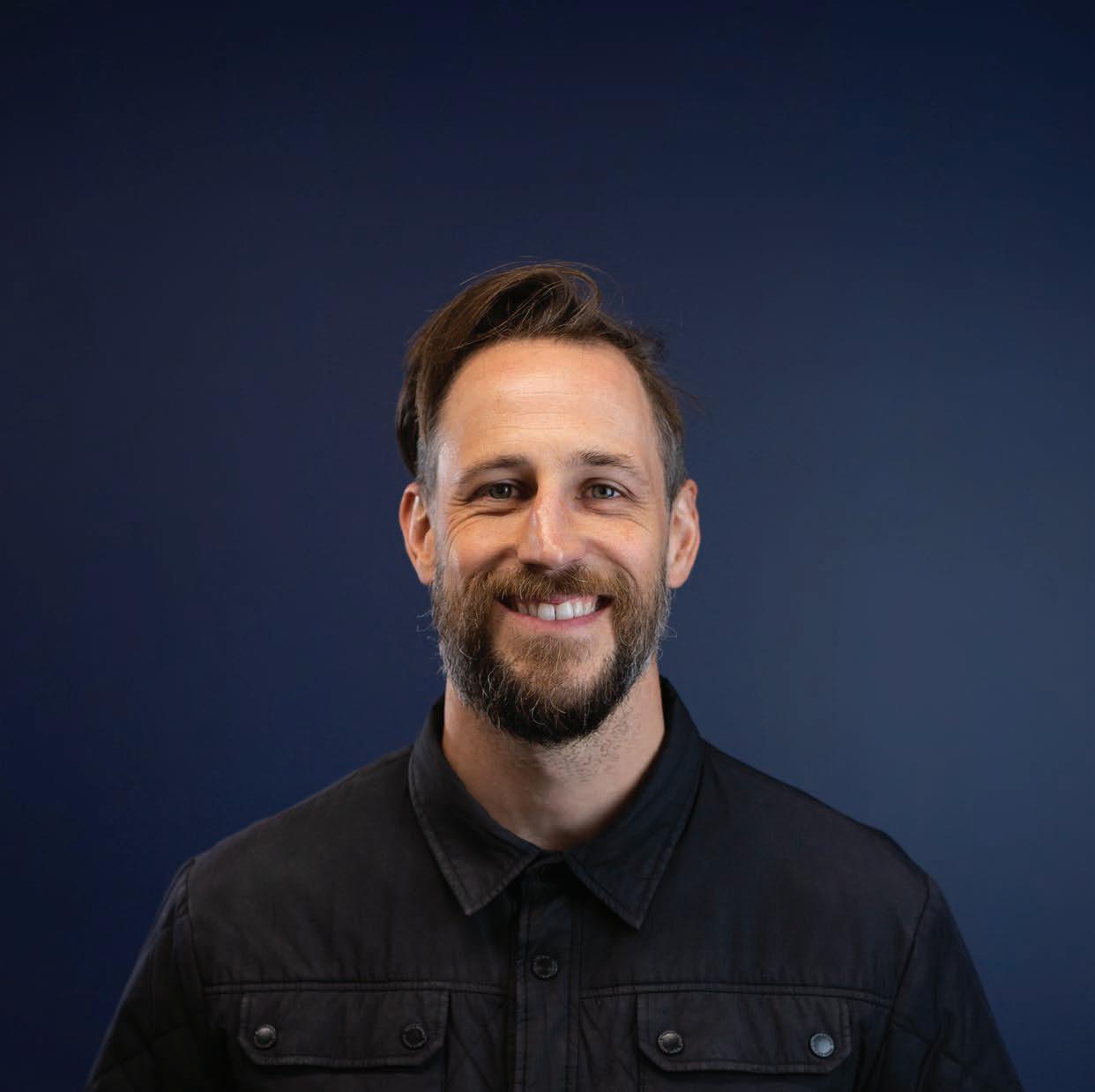 Dave Hockly Data Story
Dave Hockly Data Story
Could technology help us overcome the labour shortage?

Tech solutions could help to alleviate sta shortages and improve productivity for Queenstown Lake’s struggling hospitality and tourism sectors.
Business owners throughout Aotearoa are facing labour shortages and the New Zealand Institute of Economic Research’s (NZIER) latest quarterly survey of business opinion found that companies were still feeling downbeat in the September quarter. 9% of businesses reported capacity as the primary constraint on their work and while shortages in skilled and unskilled labour are easing, we’re still not where we should be. But sourcing more labour might not be the silver bullet.
by Jessica Allen
According to OECD gures, New Zealand’s productivity is below average when measured in GDP per hour worked, and it’s because we’re working hard, but not smart.
OECD are the Organization for Economic Cooperation and Development, and they work to create policy standards and promote sustainable economic growth amongst 37 countries including the UK, Australia, America and countries throughout Europe.
Kiwis are lagging behind and this has been accredited, in part, to our lack of adoption of technological tools.
According to OECD gures, Aotearoa’s annual average hours worked per worker was only 4% more than the average, however, our labour productivity is low. Ireland led the charge – said to be working smarter, not harder – by investing in tech and the talent they already have. eir GDP per hour worked was sitting at over $160, we, however, are sitting in 25th place at around $80 of GDP per hour worked. We’d have to work a whopping 10.7 hours a day longer to produce the same amount as Ireland – that’s an impossible 53.5 hours a week more.
So, how do we work smarter and boost productivity?
Arti cial intelligence (AI) is one thing that can be implemented by businesses to improve productivity. is so ware can allow applications
to become more accurate at predicting outcomes and ease the workload on humans. It isn’t intended to take away human jobs or interactions, but rather to make things easier and create a better customer experience. Pradeesh at QRC teaches the Certi cate in Machine Learning and believes it’s a great course for business owners to understand and begin to implement AI into their every day.
“I think that we need to embrace newer technologies such as ChatGPT. One thing we teach here is that tech is here to stay, but we need to be responsible,” says Pradeesh.
“We can’t just throw AI in with the kitchen sink without understanding it – it’s really important for us to understand that. Machine learning isn’t really fancy – I will give an analogy of being a smart student; imagine that every student managed to read all the books, all the Encyclopaedias and have all the knowledge there is – you’re like a walking Wikipedia. at’s what AI is. It can just spew out answers.
“It has learnt from us that there are biases among genders, among races, so AI can be biased towards a certain group of people or a minority group of people – we need to understand this bit and that’s why we talk about responsible AI. Embrace technology, understand how AI works, but know its limitations, where these come from and how we can counteract that.”

April 2023 | Issue 28 LAKES BUSINESS
Image by Alex Knight
Image by Alexandre Debieve
AI technology can answer questions regarding reservations or availability, translate menus or booking information and aid in communication. It can take away mundane tasks for sta , allowing them to focus on providing excellent service and tasks that can only be carried out by humans. is tech also learns as it goes, so it will become smarter and more intuitive over time.


If AI still isn’t appealing, there are plenty of other tech solutions out there to make business life easier. Tools exist to speed up jobs such as the cloud-based invoicing programme Xero, which will create invoices, track cash ow, capture bills and receipts, and automate accounting admin. HR so ware such as Bamboo HR can store employee contracts and work permits, set automated task reminders for Visa expirations, and automate onboarding. ere are also payroll systems, such as Crystal Payroll, which allows employees to ll in their timesheets, can integrate with accounting systems, and manage holiday pay calculations. Enterprise resource planning (EPR) is another piece of so ware that some businesses use to manage and automate complex processes. e system manages and brings together processes like Point of Sale, accounting and inventory management under ‘one roof’ – so that people can see how their business is operating at a glance. New Zealand-based company QONTRO o ers a cloud-based ERP system and believes that investing in this tech will innovate business processes to boost long-term productivity and resilience. ey say that this technology reduces the time required for repetitive, time-consuming tasks, whilst simultaneously providing valuable new insights through reporting and analysis tools.
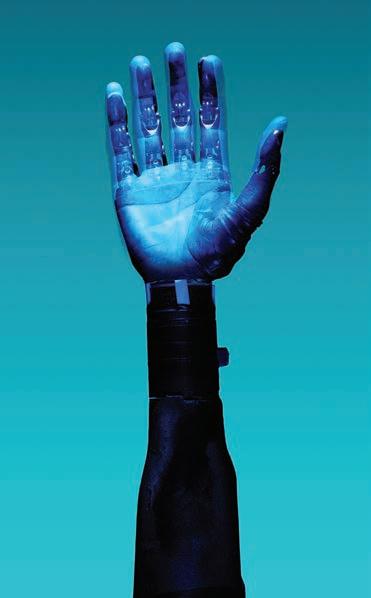
Local business, Loaded, o ers a programme for restaurants and cafes that manages revenue, labour and cost of goods in real-time from one



so ware hub. Its features include a budgeting tool that enables users to set targets by the same day of the week last year, a real-time wage analysis that connects to the payroll system, and a rostering tool. ey also o er smart stock management that delivers an 8% reduction in the cost of goods, and a comprehensive reporting tool that is customisable.

Loaded says it’s helped customers gain pro tability and improve their e ciencies, and as a result, are looking to expand across the ditch to Australia. ey recently raised $3.25 million through a combination of equity and debt, and are looking forward to investing further in product development and their team.
First Table has recently released Regular Table – a new booking system that enables real-time booking at restaurants. Founder and Chief Executive Mat Weir told Stu , “ e revenue potential going from booking just the rst table of the night to monetise any table of the night even across our existing network is ginormous.”
e company realised that customers were using First Table to not only book the rst table of the night but also to read reviews, discover good restaurants in cities and were happy to do regular bookings.





























Whatever the business you’re in, there’s technology out there to streamline processes and take away the repetitive tasks that people generally do more slowly. And being human, we’re more likely to make mistakes. Where we go wrong, it seems, is in nding, adopting and integrating this technology into our businesses. While many businesses are beginning to adopt technology, we’re some way from catching up to our Irish counterparts.
Additional sta and working longer hours aren’t viable solutions to New Zealand’s lag











in productivity. Technology such as AI, apps and so ware programmes will allow us to work smarter, not harder, and future-proof the hospitality and tourism industries. Technology won’t take our jobs away, but simply free up more time for important human tasks.
Over the past decade, New Zealand’s productivity has plateaued – we’re on a similar trajectory to Columbia. is isn’t due to a lack of hard work, but rather a lack of adaptation of new tech. e OECD’s 2022 Economic Survey of New Zealand recommended a greater focus on digitisation to boost productivity and put us on level-pegging with other countries. ey advised that digital skill acquisition will make economic growth sustainable, inclusive and resilient, and will help to overcome labour shortages in the country.
April 2023 | Issue 28 SOUTHERN LAKES BUSINESS MONTHLY Queenstown Office: Level 2, Craigs Investment Partners House, 36 Grant Road, Queenstown Wanaka Office: Level 1, 78 Ardmore Street, Wanaka
021 568 315 | 03 441 2743 louise.denton@toddandwalker.com Providing specialist advice on family matters: Relationship Property, Contracting Out/Prenuptial Agreements, Separation, Family Violence, Protection Orders, Care of Children, Guardianship, Dissolution of Marriage, Oranga Tamariki Proceedings and PPPR Act Proceedings. CONTACT US
MEET THE FAMILY LAW TEAM
Image by Thisisengineering Raeng
Making magic
by Sue Fea
Long before it was fashionable for restaurants and destinations to sell themselves around ‘story’ an innovative Queenstown company was doing just that, creating ‘magic’ in the process. Now a multi-award-winning tech entertainment company operating some 200 operations in 16 countries, Magic Memories has taken full advantage of technology to drive positive change and revenue growth.
Founded in 1994 by then-recent University graduate John Wikstrom and Stu Norris, they saw an opportunity to capture photos of tourists having the time of their lives.
“Rather than waiting two or three hours to collect their photos, we created new, beautifully designed take-home products and had them ready for immediate purchase,” says Wikstrom. Every attraction brand has a great story, explains Wikstrom.
“We took it as our role to tell that story for them and added the photos to personalise the product. We hired actors and backpackers to be part of the photography process, using scripts that made the customers laugh, and capturing authentic emotions, which was our goal.”
Magic Memories enjoyed success with this model for many years, until the internet and mobile phones arrived on the scene and everything went digital.
“In about 2012 we did some major market research and found customers wanted all of their photos and videos available on their mobile phone and they wanted it for free.
“Our rst ‘aha’ moment was customer service, the second was going digital,” says Wikstrom.
“We listened and designed a solution which we rst introduced at Sydney Wet’n’Wild Water Park. It was an entire digital o ering that was built into the ticket price.”
e attraction was paying them to create and distribute personalised content experiences directly onto customers’ phones. In return, paying customers were now their active social media marketers.
Magic Memories moved to printing-to-order and building an e-commerce database that created new communication and revenue channels. At the time they had about 50 operations around New Zealand and Australia and had just broken into the UK.
“ at test was a game changer. Disney was building a similar concept at the same time, spending approximately $US 6 billion.
“Everyone watches Disney and we had enough proof, so we set out to bring what Disney was
doing to the rest of the world’s attractions,” says Wikstrom.
Customers loved it and customer engagement went through the roof.
eir next challenge was building the so ware capability and the team to deliver the new concept at scale.
A capital raise followed. Magic Memories built a new executive team and appointed a board of directors to take the new concept to the world.
“At the same time, we decided to acquire a US competitor. ey operated 85 attractions in 30 states there.”
Wikstrom, and his wife Maria, moved their young family to New York where he spent four years making it work. ey’d done the same thing when breaking into the UK, spending eight months in London in 2013.
e company’s strategy is to be known for quality content and for making people smile.
“We create and deliver our business model from our own cloud-based technology platform.
“People are still critical to our success, but we can now deliver end-to-end systems without the need for any additional labour. We’ve grown from a single revenue source to four revenue streams.”
Half the business is now licensing systems, products, services and so ware.
“ e brand partners remain in control of the primary functions like pricing, banking and licensing our system,” explains Wikstrom. “We design the system, create the products, provide the support and work on improvements while they run it.”
ey stuck with their tried and true strategy of “hiring people who’ve been where you want to go”, bringing experienced tech entrepreneur Roger Sharp on board when the pandemic devastated their revenue in 2020.

All 175 attractions they worked with, in 10 di erent countries, stopped operating due to Covid-19 restrictions.
Sharp led them through “crisis mode” and helped them bounce back. Magic Memories pushed into new markets and raised about $25 million for new developments – including a contactless system.
“Customers love great content. Being cloudbased, and having the ability to automate means we can now look at more sectors – resorts, stadiums, cinemas, restaurant brands and the likes.
“Wherever people enjoy being together for a branded experience, Magic Memories can add value.”
April 2023 | Issue 28 LAKES BUSINESS
John Wikstrom
Discussions have been underway with tech companies and investors keen to back entrepreneur Roger Sharp and not-for-pro t Whakatipu Hangarau Trust’s bid to establish a tech development agency for the Queenstown Lakes region.
e trust was set up last year to encourage the expansion of the local tech industry during the next 20 years, in a move to safeguard the district and diversify away from its traditional sole tourism focus.
A lot of work’s already been done to set up a strategy document and the trust’s now consulting with Queenstown Lakes District Council, the University of Otago, key industry gures and economists.
“We need to build a clear consensus, with collaboration at the heart of our plan to build out the tech sector,” says Sharp.
“During the next few months, we’ll share the strategy, then raise the required funding to build a small development agency.”
He’s not expecting it to be costly – raising funds to cover a few hundred thousand dollars in operating overheads per year. e trust won’t be going to the government cap in hand to build what will be a small, professional organisation.
“ ere are huge priorities around New Zealand right now and we want to fund ourselves privately to the extent we can,” he says.
Turning to tech
 by Sue Fea
by Sue Fea
MBIE principal policy analyst Ron Clink has been seconded to help.
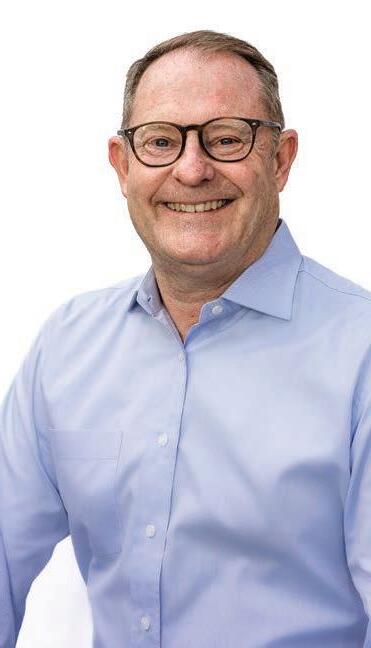
e transition won’t be a rapid process, with Sharp expecting it to take some 20 years to ‘get it right’. In the rst three to ve years the focus will be on putting the right ingredients in place to achieve long-term success.
ere are already large and small tech companies interested in stumping up to make it all happen.
“We’re con dent the funding will be available.” While tourism’s doing well right now, Sharp says we can’t forget what the Queenstown area’s just been through.
e plan is to build tech up to a greater proportion of GDP but in a way that isn’t to the detriment of the local lifestyle, he says.
“We may only need 2500 to 3000 people in 20 years to make that happen and create a successful niche. e incremental population growth may only be in the low thousands,” he says.
“ ese will be clever people, some of whom we train in town, and who earn considerably higher wages and inject more into the local economy.” However, the move all hinges on a ordable housing development within the next 10 years.
“Collectively, we need to work on housing, childcare and education,” says Sharp.
“I’ve spoken to techies here who are living in caravans and want to be here, but they can’t nd a home. Another woman is working on a startup but paying more for childcare than what she’s earning. Clearly, it’s an acute problem.”
Sharp, who has owned a Queenstown home for 20 years, has an accomplished international career as a tech entrepreneur. He’s been building and selling tech companies since the mid-1980s, some listed on the Australian Stock Exchange. He chairs the boards of Webjet, Iress and Lotto NZ, and is a former deputy chair of Tourism NZ. Tourism makes up $3.3 billion – 60 per cent of our GDP with tech clocking in at only 1.8 per cent, explains Sharp; “ at could be at 10 to 15 per cent.”
During a tour of the US, he met with the movers and shakers in towns which had grown their local tech sector and retained their small-town atmosphere, like Bend in Oregon.
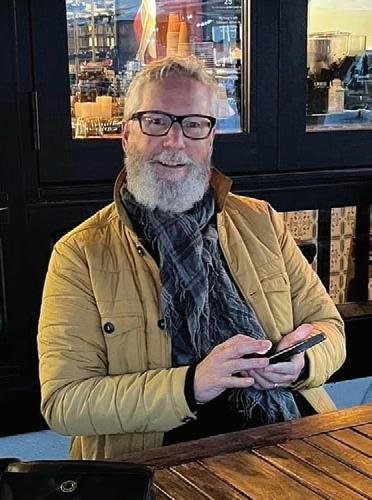
Sharp explains that it’s important to get the right mix of start-ups, scale-ups, remote workers and
big multinationals relocating for lifestyle bene ts. “We want to attract highly-educated, well-paid people who deliver and we need a university training people in tech,” says Sharp.
“It’s all about our contribution to GDP. One tech worker is equal to several tourism workers.”
“We have some absolute tech gems here in Queenstown Lakes doing exciting stu , smart and committed people, but people aren’t working together. ere’s no plan or strategy,” he adds. e people in Bend were all on the same page, developing a now ourishing tech sector under the leadership of Silicon Valley venture capitalist Dino Vendetti.
“ ey were all collaborating and upholding small town prosperity values.”
Kiwi Roger Sharp and his wife, Christine, returned to New Zealand to live in Queenstown in 2016. His great-great-grandfather was an early coal miner in Central Otago and his brother owned the gold elds Cobb & Co Coachline .
“Queenstown is our absolute heart and soul. I feel an obligation to help,” says Sharp, with him and his wife funding much of the project to date.
April 2023 | Issue 28 SOUTHERN LAKES BUSINESS MONTHLY
Roger Sharp, who’s launched Whakatipu Hangarau Trust to grow our local tech sector
MBIE principal policy analyst Ron Clink, who’s been seconded to help grow our tech sector, during a recent Queenstown visit.
What makes you buy something? What makes you behave in a certain way?
Like all good marketers, Dave Hockly knows the answers to those questions. But what really interests him is using cold, hard data to dig down into the detail of people’s decisions, adapt marketing strategies and measure the results and revenue.
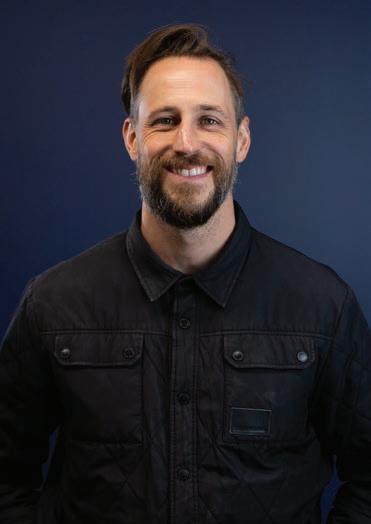
Hockly launched Queenstown company Data Story in August 2018, a er leaving Wellington for the snow of the Southern Alps.
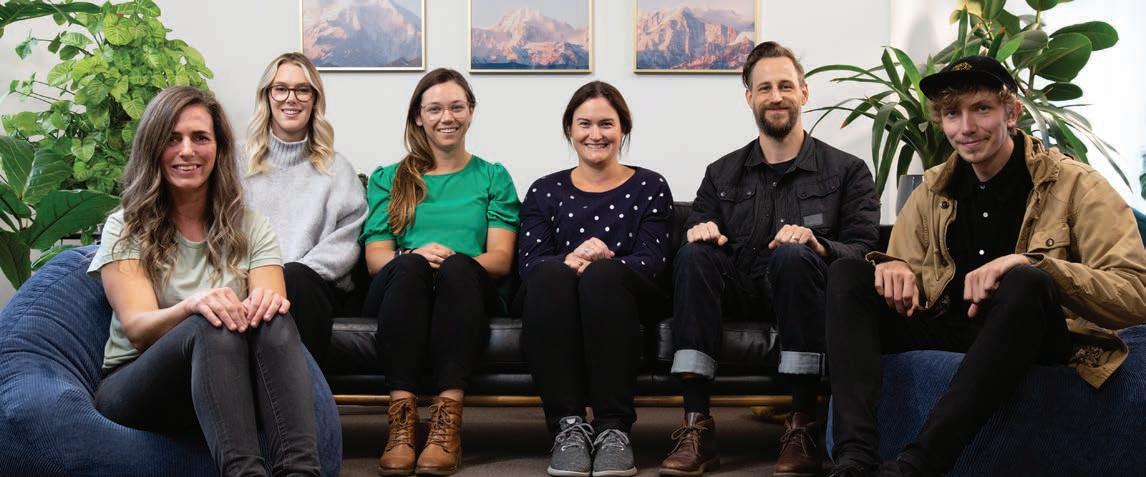
In ve years, the company has grown from just him to a team of seven, based in o ces on Gorge Road.
“I learned through running previous businesses, which weren’t marketing businesses, that marketing is as much a science as it is an art,” he says.
“It was a hard lesson because if something didn’t work, I had to pay for it out of my own pocket. It’s actually hard to focus on the right things, rather than looking at what just sounds cool.
Business insights with Dave Hockly
by Paul Taylor
“ at pushed me towards data-driven or evidence-based marketing. I liked the idea of being able to test a hypothesis, map things out and benchmark.
“Once we’ve got that benchmark, we can be creative, we can test and learn. And we can do it faster and with less stress, because we can see if we’re moving the needle or not.”
Hockly graduated with a degree in tourism management at Victoria University, before working at Wellington agencies and consulting. He moved south and says it was initially di cult to get a foothold in Queenstown, before winning the contract to help Cardrona Alpine Resort.
“We were too small to deal with the winter season, but Nadia Ellis, their marketing manager, who is an absolute gem, said ‘why don’t you give us a hand for summer?’
“We helped them triple their online revenue over the summer and it’s all really kicked o from there.”
Since then, the client list for the digital specialist agency has included Destination Queenstown, Harcourts, Queenstown Resort College, the Co-operative Bank, Microso , Fergburger, First Table, the New Zealand Government and many more.
As well as steering people towards buying products and experiences, work has included quitting smoking campaigns.
“A lot of what we do is understanding the buyers’ decision-making journey through data. It’s crazy how much marketing can persuade people to do something, almost without them realising it.
“We can see someone who thinks they’re making an impulse decision but they’ve had 21 ad impressions with a bunch of messaging designed to appeal to their deepest desires. People are still autonomous but it’s very hard when someone knows what you want.
“I do think, because of that, marketing can be on the right or wrong side of the conversation. e goal should be to help people make better decisions for themselves, rather than just selling stu for the sake of it. I think marketers can change the world in that way.”
In Queenstown, that translates as the ability for companies to give locals and tourists those lifea rming moments.
“As businesses in the region start to get more digitally mature, we can have less competition and charge a whole lot more,” he says.
“I don’t mean scalping people because they have to buy a bottle of water. People come here to have incredible one-of-a-kind experiences, and when you provide that, they’re happy to pay more. It’s the same reason you’ll pay $12 to buy a beer in a pub when you could buy a box for $20.”
Data Story focuses on the strategy, using the best o -the-shelf programmes to compile and present the data.
“Everyone who makes a decision goes on a journey. No one just gets out their credit card. We have a framework around that, where we take a client’s marketing initiatives and map it to the buyer’s decision journey. We look at how they communicate, how they can reach the right people, the right volume, how they build trust, what marketing will give a potential customer a moment of delight, all those sorts of things.
“And then you can use the data to diagnose problems, look for causation versus correlation, and track results.”
Understanding the psychology can lead you to view the world in a di erent light.
“My wife does say I’m a shocker in the supermarket, looking at the product’s marketing positioning, analysing the wording and branding. It’s like when a builder walks into a house. ey look at it in a di erent way.”
April 2023 | Issue 28 LAKES BUSINESS
Dave with the Data Story team
Dave Hockly
Technology and Innovation is critical in shaping the future of tourism
 by Joseph Mooney MP for Southland and Shadow Spokesperson for Tourism
by Joseph Mooney MP for Southland and Shadow Spokesperson for Tourism
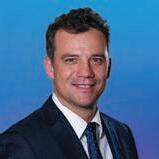
As the new Shadow Spokesperson for Tourism, I’m really excited to work with the country’s tourism industry to show o all the amazing things our country has to o er.
Tourism is vitally important for both our local economy and the global economy. It helps create jobs, drive economic growth, and allows for cultural exchange.
However, to keep up with the constantly changing world, technology and innovation are becoming increasingly important in the tourism industry. ey help us stay e cient, accessible, and sustainable.
According to the Tourism Industry Association of New Zealand (TIA), the tourism industry in New Zealand has made signi cant strides in reducing its carbon footprint, with the sector’s carbon emissions dropping by 21% since 2007. is achievement has been largely attributed to the adoption of green technologies and practices,

such as the use of electric and hybrid vehicles to and from airports and on tours, renewable energy or energy-e cient lighting or appliances, and eco-friendly accommodation.
ere are so many bene ts to using technology and innovation in the industry. It can unlock potential and reduce backroom overheads, especially in a tight labour market. For example, automation of repetitive tasks can increase productivity and e ciency, allowing us to accomplish more in less time.
With online booking systems, automated checkin and check-out processes, and chatbots that can answer questions 24/7, we can access information and connect with travellers and visitors in ways that were once impossible.
We also use smartphone apps and virtual reality to provide travellers with real-time information, immersive experiences, and historical insights into their destinations.
However, we need to recognize that technology presents challenges and potential risks, especially when it comes to the workforce. National recognises this challenge and our policies focus on investing in education and training to ensure workers can learn new skills and adapt to the changing landscape.
Immigration policy is also critically important to ensure we have the people with the necessary skill sets to service the industry.
Our policies are further designed to encourage innovation and entrepreneurship, including increased investment in research and development and support for start-ups and small businesses. By doing this, we can create an environment in which businesses can thrive, driving economic growth and creating new job opportunities.
Tourism is about communities and about authentic experiences for visitors connecting them to our environment, our culture, and our sense of place in the world. As the tourism industry continues to evolve and adapt, it’s clear that technology and innovation will play a crucial role in shaping its future. I am excited to share in that journey.
April 2023 | Issue 28 SOUTHERN LAKES BUSINESS MONTHLY
Sponsored
Image by Joel Staveley
Queenstown’s planned $6 million digital studio will provide a blank canvas, and also modernday brushes and paint, for lmmakers, game designers, content creators, and a host of other creative and corporate projects.
Target3D is building the facility in Remarkables Park’s Research & Innovation Queenstown (RIQ) hub.
e London-based company are the “mechanics behind creativity”, providing the latest cuttingedge tools in virtual production (think green screen) and motion capture.
ey’re also big on education, both in terms of educating those industries on how to make the most of the tech, and also educating people to work in those industries, lling the massive skills gap in New Zealand and abroad.
As such, the Queenstown studio will be a lesson in what can be done, and how to do it, from the very start.
New studio’s big plans
by Paul Taylor
Shannon Dowsing, Director of Target3D New Zealand and former Tairāwhiti Gisborne councillor, says: “From the day they give us the keys, we’ll be documenting everything from an R&D perspective.
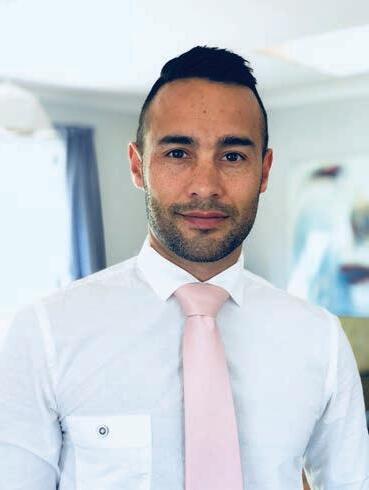
“We’ll share the journey of the build, what it takes to build one of these studios in New Zealand, the challenges, why we select particular products over others.”

e company has already designed and managed studio builds at elite education institutes including LIPA (Paul McCartney’s former school), Cambridge University, the University of Liverpool, Rose Bruford College and Goldsmiths, University of London.
It is a supplier of the tech to other organisations in the UK and Spain and has also established the UK Institute of Virtual Production, supported by the UK Government, as a resource for the lm industry.
“We want to do the same here and provide a resource for the NZ lm industry,” Dowsing says.
e Queenstown studio will have essentially identical specs to Target3D’s new studio in London.
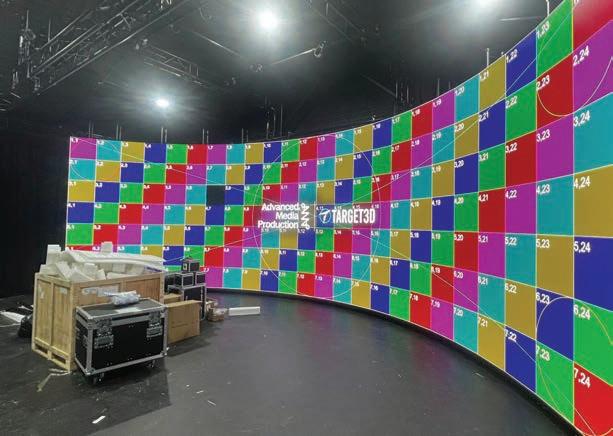
“ e reason is we want to be able to do colocation projects. We want to be to have one actor on our stage in Queenstown, another in London, and have them interacting as if they were on the same set.
“We can create scenarios where we have two perfectly indistinguishable plates, with matching robotic camera movements, identical background, lighting etc.”
e exacting specs for the 450sqm space will even in uence Remarkables Park’s building design, such as weight-loading for the foundations, ceiling heights, electronics and other considerations.
Even Chorus has come to the party, upgrading its
exchange capacity in Frankton to take the fastest high-speed bre broadband.
Creating educational pathways is also at the heart of what Target3D does, along with its sister company Rāngai.
“I looked at bringing Target3D to New Zealand about ve years ago. At the time I was a district councillor and on our economic development agency here in Tairāwhiti.
“And the problem with introducing the business was the concept of talent importation, and gentri cation, creating issues in the region.”
Realising there was a very small workforce for such industries, Dowsing set up Rāngai to provide education. It is the rst company to have a contract with the new Te Pūkenga (New Zealand Institute of Skills and Technology) as an accredited education provider.
It provides screen production training from its Tairāwhiti Gisborne studio, including paid work on real-world productions, and operates a cast and crew agency.
e aim is to have a workforce which is 75% local and that ethos will come to Queenstown’s Target3D studio, although how it will tie in with Te Pūkenga’s Southern Institute of Technology, Otago University and neighbour Wakatipu High School is still to be worked through.
“In Tairāwhiti very few people go on a tertiary pathway, but that’s di erent for Queenstown. So those are the conversations we’ll have. What gap do we need to ll? Are we workforce development, rather than an education provider, helping students upskill with real-world experience outside their student hours?”
e relatively small studio expects to employ six permanent sta , with dozens more working there on productions.
April 2023 | Issue 28 LAKES BUSINESS
Shannon Dowsing
5 minutes on Machine Learning with Pradeesh
by Jessica Allen
QRC’s Machine Learning Tutor and Tech Ambassador, believes that arti cial intelligence (AI) technology can help alleviate some pressure on Queenstown’s hospitality and tourism industry. e 16-week course he teaches tells participants about AI within New Zealand and how they can utilise it. Pradeesh completed a PhD in Computer Science at the University of Otago and has been teaching the course since November last year.
He refers to himself as a tech evangelist and believes that AI won’t take jobs away, but rather make things easier – he wants us to harness technology and upskill ourselves to use it to progress. Some examples he gives on how businesses can utilise AI are through booking systems, creating loyalty programmes where systems can recognise regular customers, and to help translate or cater to di erent markets – AI can help to translate menus or allow those that speak English as a second language to navigate websites and make bookings.
“ ere are so many unknowns because we do not know what we don’t know,” says Pradeesh, “I highly recommend that people, especially business owners, who want to upskill or understand how AI could help their business to take a course or to have a chat. Just come in and understand what AI could actually do to help your business – AI by itself can’t do anything, but with input from a human we could do lots of interesting things.”
Some people and businesses may be resistant to embracing AI and new technology as they think it will take jobs away or remove that human touch. Pradeesh says that as it stands, AI can’t “think outside the box” and is there to work in conjunction with humans, not totally independently.
“It shouldn’t be used as a crutch; it should be used as a tool. I can understand the fear for a lot of people – there’s one thing AI can’t really take away from us, and that is our human ingenuity in the way we think outside the box. ey can’t think, so machines are very good at analysing patterns and they can give you insights. We can use AI as a partner to do the heavy li ing and give us insights, but we use our human intuition and intelligence to make sense of what the AI says and advance ourselves. I can understand that there may be resistance, but it’s important to understand that AI has its limitations,” says Pradeesh.
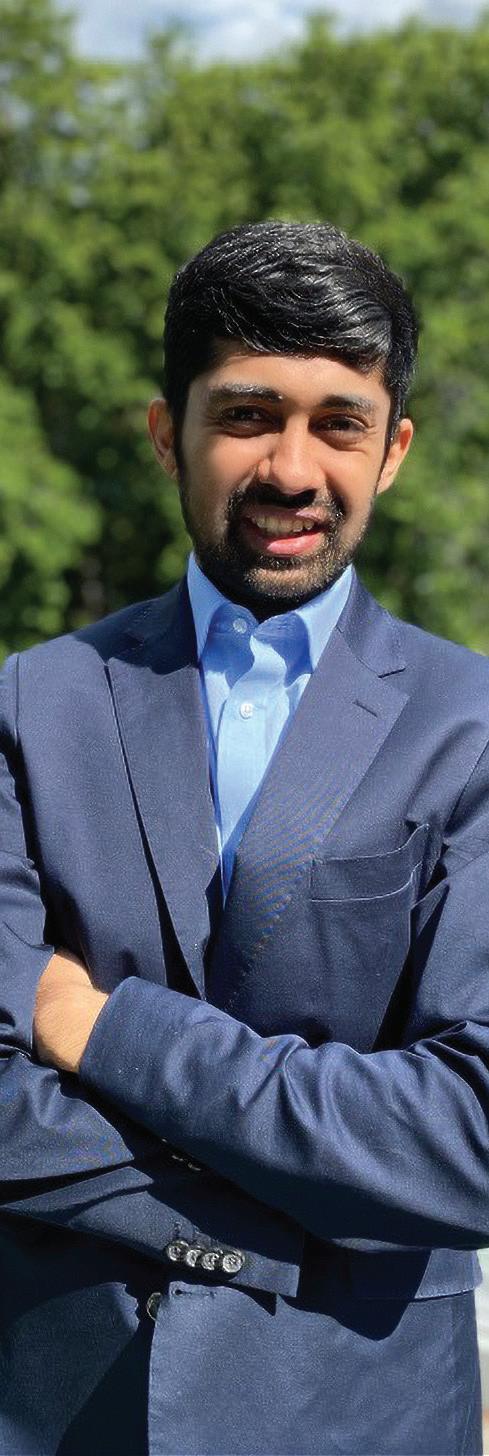
April 2023 | Issue 28 SOUTHERN LAKES BUSINESS MONTHLY

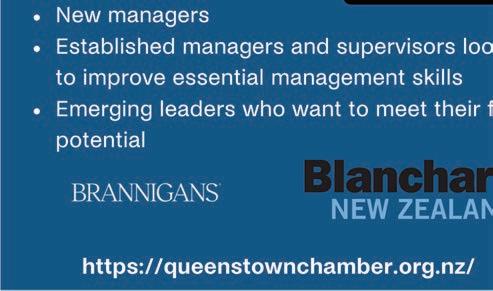
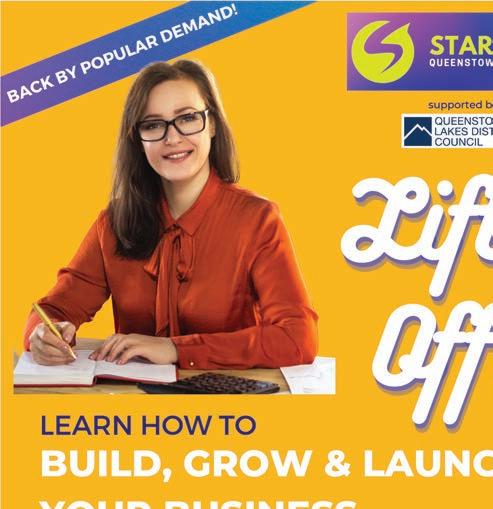

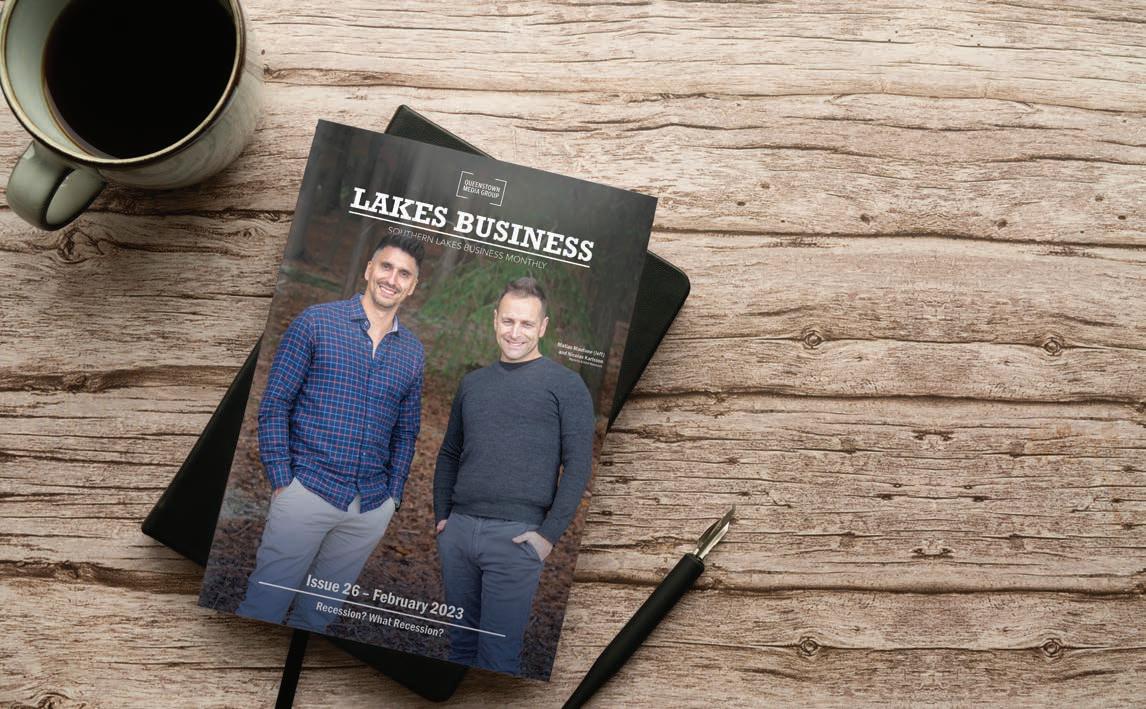








April 2023 | Issue 28 LAKES BUSINESS LAKES BUSINESS Advertise in The dedicated monthly business magazine for the Southern Lakes. Next issue’s focus: Accommodation Contact info on the back page
Loaded with potential
by Sue Fea
When your local student pub isn’t operating to its full potential you buy it and x the problem, right?
at’s what friends and Cook Brothers founders, Richard McLeod, James Arnott and David and Ben Bulling, did aged just 21.
In the following years, Cook Brothers Bars quickly developed. ey added a stack of bars across the country to their stable and formed Cook Brothers Construction to help get the job done.
Arnott had a strong interest in technology and was frustrated with the ine cient hospitality systems that were available, so the team launched their own – Loaded.
Now 40, they’re a far cry from those early student days when they made the bold move to bid for the lease on Dunedin’s famous Captain Cook Tavern. “We thought it was pretty unlikely, but the breweries owning it were doing such a bad job,” says Richard McLeod.
“It felt like a moon shot for us to be the right buyer, but the expressions of interest process took so long that the quali ed established operators pulled out.”
Cook Brothers enjoyed great success in a short space of time, working many hours to make the businesses work.
“We had plenty of energy then. at’s one of the bene ts of starting at 21, and the naivety of youth,” says McLeod, “It was exciting and fun.”
But running the di erent operations together became unwieldy. So in 2013, aged 30, they sold Captain Cook Tavern and split the remaining bars and construction operations between them.
e Bulling brothers, with their engineering expertise, took over the construction business. McLeod and Arnott took the hospitality businesses and Loaded.
ese days, Arnott owns Cook Brothers Bars, which includes Queenstown bars Searle Lane and Rhino’s Ski Shak.
A er selling Loaded, McLeod returned to the business as CEO four years ago. His sole focus is now on growing the successful business further.
“We’re running at just under 1,000 bars and restaurants across NZ, representing about 30 to 35 per cent penetration into the market,” says McLeod.
e back-of-house system has made huge di erences for clients.
“We’ve got case studies that show it’s improved pro tability by 220 per cent,” explains McLeod.
“People have told us they’d have gone out of business without it.” With businesses across the country struggling with sta ng shortages, Loaded is relied on even more for stock management, time-sheet management and rostering, budgeting, reporting and reconciliation.
“We hired one developer, and then two, and started developing a system and reporting tools. Over time we had a cloud-based hospitality system, which became Loaded,” says McLeod.
“Others in the industry asked if they could use it when they saw what a huge di erence it had made to us. Once other operators started using it the value was eye-opening.”
Loaded was before its time, with the hospitality industry then a long way from adopting digital platforms, so they waited until the right time to actively pursue growing the business.
Industry disruptions during Covid proved to be the perfect timing, catapulting Loaded into the spotlight as more hospitality businesses realised they needed to adopt technology.
“We’ve been a core digital product for hospitality since then.”
Loaded is sold on a monthly subscription SaaS (So ware as a Service) model with operators accessing it through the cloud.
“It’s been pretty transformational for people’s businesses once they implement it,” says McLeod.
To break into the Australian market, a signi cant injection of capital was required.
A recent capital raise provided that with Invest South becoming a major partner, investing $1 million and private investors (several South Island based) putting in another million. A further $1.25 million came through the government’s Queenstown Economic Transformation and Resilience Fund, administered by Kānoa.
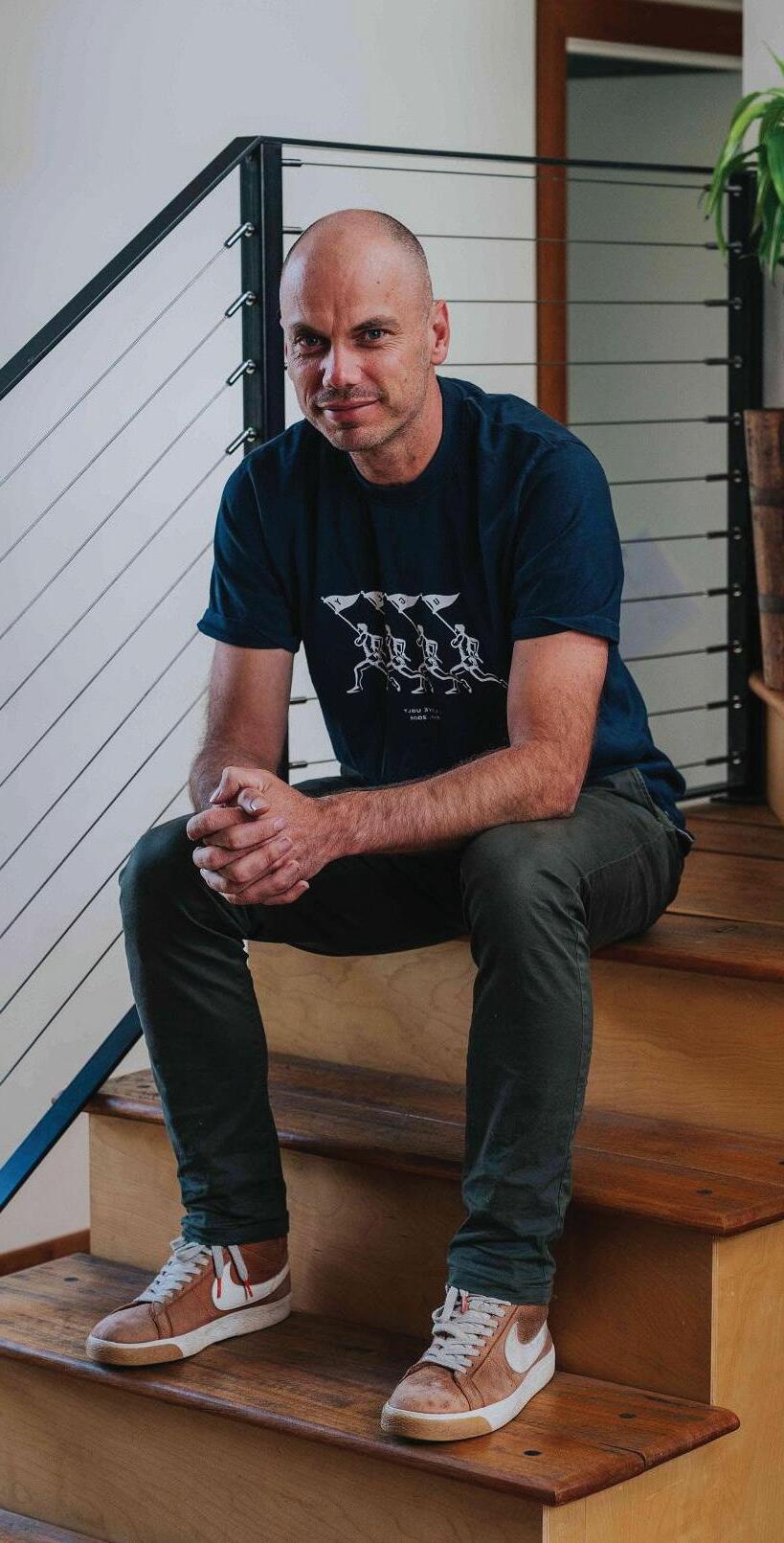
is has enabled them to build a product that’s speci c to the Australian hospitality industry’s needs. Five so ware developers joined Loaded’s Queenstown-based team in January, several from overseas, bringing the total New Zealand team to 14. McLeod expects to hire a dozen more by 2025.
A head of sales for Australia and New Zealand will be appointed this winter and based on Australia’s East Coast, where they’ll build a sales team this year.
It’s safe to say the Queenstown friends have come a long way, from buying their local pub to running a multitude of businesses and helping to grow the town’s tech industry.
April 2023 | Issue 28 SOUTHERN LAKES BUSINESS MONTHLY
Loaded CEO Richard McLeod
Wanaka’s latest community space is underway. e t-out of the new youth, community and sports facility is about to begin, which will be located on Plantation Road at the former Mitre 10 site. Naylor Love has been appointed as the lead contractor to transform the building. QLDC has budgeted approximately $4.2 million for the project, which is an increase of $90,000 from the initial budget, which was approved in April 2022. is increase is due to additional re protection measures.
e plan includes two multi-use indoor courts, a separate studio and an area for Kahu Youth and Aspiring Gymsports. QLDC Sport and Recreation Manager Simon Battrick says; “We expect to complete the t-out by the end of July but are working with our construction partner to allow Aspiring Gymsports earlier access to coincide with the end of the lease at its current premises.”
Full by-election triggered
e Arrowtown-Kawarau ward will need to vote for a new seat at the QLDC’s table. It is vacant a er councillor Neeta Shetty’s resignation in early February. She was elected for the newly-formed ward in October 2022 and stood down due to personal reasons that made continuing the position untenable. Melissa White, who was unsuccessful in gaining the seat last year, will stand once again. Glenorchy Community Association Chairman John Glover will also stand. Nominations closed on 9 March. Voting papers will be mailed out to electors on ursday 13 April with voting closing on 5 May.
Tourism and hospitality survey
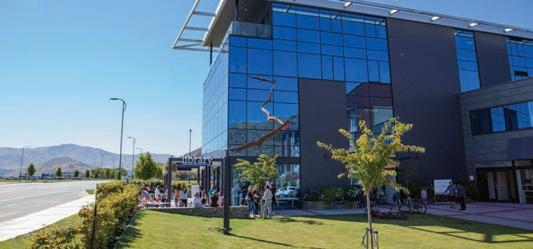
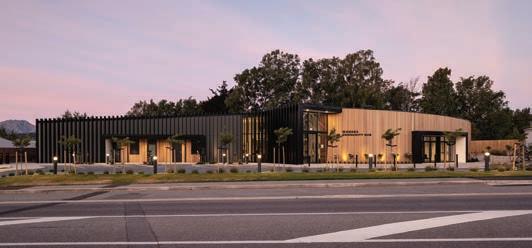
Aotearoa now has better data on working conditions in the tourism and hospitality industry a er the He Tangata survey conducted by AUT. e survey was commissioned by the Ministry of Business, Innovation and Employment – over 900 people took part. ese results will help to shape the Tourism Industry Transformation Plan, which was launched in Queenstown on 1 March by the Minister of Tourism. Due to the loss of visitors as a result of the pandemic this plan has been put in place to contribute to the building of a regenerative tourism system. Some interesting ndings to come out of the survey include that 59% of sta were either planning to leave their jobs within a year or were unsure if they would stay – a third of those wanted to leave the industry altogether. Additionally, 42% reported not always getting rest breaks, 23% had experienced bullying and harassment, 13% had received no training at all and 38% received only on-the-job training.
Advertise in Lakes Business
Contact 03 409 2800 | info@qmg.co.nz
Catherine Mercer - Account Manager | 027 777 2785 | cat@qmg.co.nz
Kylee Evans - Account Manager | 021 044 2968 | kylee@qmg.co.nz
David Gibbs - General Manager | 021 514 072 | davidgibbs@qmg.co.nz
QLDC Financial Literacy Workshops
Frankton Library has launched a series of nancial literacy workshops alongside ASB Community Banker Shyla Hona. e rst event took place on 23 March and looked at everyday money tips. It focused on goal setting, budgets, where to get nancial support and free tools to help you manage your money. e next event will take place on 27 April and will focus on getting savvy with savings. Topics they will talk about include making a savings plan, tips to boost your savings, a rainy-day fund and free tools to help with your savings goals. e session will run from 5:30 – 6:30 pm and are free for anyone – not just ASB customers. You will need to book in to secure your spot.
Housing market still a long way off prepandemic levels
e New Zealand residential property market will need to decline for up to two more years at its current rate to reach pre-pandemic levels. e latest QV House Price Index for February shows that national home values are 24.5% higher than they were when the pandemic rst began – there has been a 12.6% drop in the last 12 months. Queenstown home values have declined for the second month running and this past quarter the average home value declined by 1.8% – this is the rst reduction since August 2020. Despite this, the average here remains 33.8% higher than it was in February 2020 compared to 5.2% growth in the 12 months to the end of February 2023.
QT Business Chamber of Commerce staff housing series
e Queenstown Business Chamber of Commerce will host a complimentary three-part housing series across April and May to educate and inform businesses about purchasing, leasing and managing worker accommodation. e April 4th event featured Kevin Davidson, Chief Economist at Core Logic, discussing the market and wider NZ perspectives and trends, and Anita Vanstone, Strategic Growth Manager at QLDC who discussed what housing strategy is and how it a ects your business. On April 18 they will host Jason Smith from Five Peaks Chartered Accounting to discuss an example of Queenstown rental property, interest deductibility and fringe bene t tax of lower-thanmarket rent, as well as Sylvie rush Marsh from MyHR discussing the relationship between being an employer and landlord, and how to include this in your employee agreement.
Advertising Deadlines
Sponsored
April 2023 | Issue 28 LAKES BUSINESS
BUSINESS BITES
Content: 12noon Tuesday Display Advertising: 12noon Thursday Queenstown Media Group 2nd Floor, The Mountaineer Building Cnr Beach and Rees Street PO Box 1546, Queenstown 9300
Wanaka community space





 Dave Hockly Data Story
Dave Hockly Data Story



















































 by Sue Fea
by Sue Fea




 by Joseph Mooney MP for Southland and Shadow Spokesperson for Tourism
by Joseph Mooney MP for Southland and Shadow Spokesperson for Tourism





















